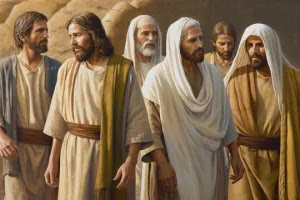[This is part 5 of Brother Adam Well's treatise on the Christian Minstry - ed]
The question of whether a single elder or a plurality of elders should lead the church is a matter of much debate among various Christian traditions. While some argue for a plurality of elders based on certain passages, a closer examination of Scripture reveals that the office of elder is fundamentally singular, with one man ultimately responsible for the oversight and feeding of the flock.
Many cases in Scripture do show a plurality of elders in certain churches (Acts 14:23; 20:17; Philippians 1:1; Titus 1:5; James 5:14). However, these passages do not require that every church have a plurality of elders, but rather describe the situation in specific churches at specific times. In contrast, the qualifications for the office of bishop or elder are given in the singular, implying that the office is fundamentally one of singular leadership (I Timothy 3:1-7). The elder must rule his own house well, having his children in subjection with all gravity (I Timothy 3:4-5). This qualification suggests that the elder's authority is not shared with others, but is singular and paternal in nature.
When Christ wrote to the seven churches of Asia, He addressed His words to the angel of each church (Revelation 2:1; Acts 20:17). The word "angel" is singular, implying that each church had a singular messenger or leader who was responsible for receiving and communicating Christ's words to the congregation. The size of the New Testament churches may have easily required additional elders to assist with the work of ministry, but this does not mean that these assistants shared equally in the ultimate oversight and authority of the church.
Even where there is a plurality of elders, there cannot be true equality by definition and example. In any group of leaders, one will naturally rise to a position of greater influence and authority. This is not because the others are less qualified or less gifted, but because leadership inherently involves a singular vision and direction. If there is true equality among many elders, who is to be the ruler of the congregation? Who will make the final decisions when there is disagreement? The Bible teaches that God is not the author of confusion, but of peace (I Corinthians 14:33). Therefore, He has ordained a singular leadership model for His church.
In the Jerusalem church, James is clearly presented as the singular leader who ruled the church and made determinative decisions (Acts 12:17; 15:13; 21:18; Galatians 1:19; 2:12). Peter and John may have been prominent apostles in the church, but James is the one who is always mentioned as the singular leader who spoke authoritatively on behalf of the church.
Let us embrace the singular leadership model that is taught and exemplified throughout Scripture. Let us pray for and support our pastors, recognizing that they are the undershepherds whom God has placed over us to feed and guide His flock. While other elders may assist the pastor in the work of ministry, the ultimate oversight and authority of the church is vested in one man. For in submitting to our spiritual leaders, we submit to Christ Himself, who is the Chief Shepherd of His church.


No comments:
Post a Comment
Thanks for commenting. If an answer is needed, we will respond.